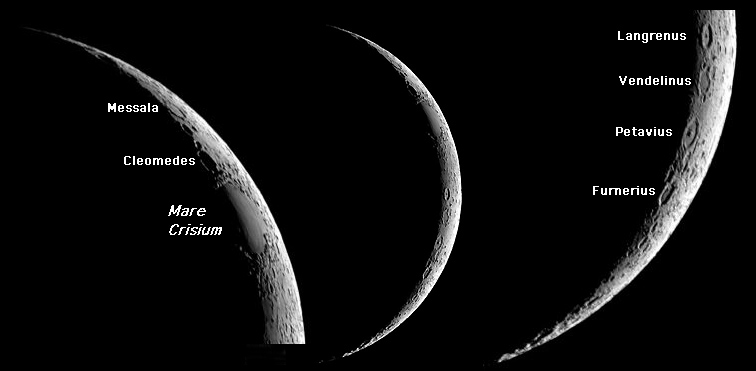Difference between revisions of "January 23, 2004"
| Line 1: | Line 1: | ||
__NOTOC__ | __NOTOC__ | ||
=Infant Moon= | =Infant Moon= | ||
| + | <!-- Start of content --> | ||
<table width="85%" border="0" align="center" cellpadding="6" cellspacing="2"> | <table width="85%" border="0" align="center" cellpadding="6" cellspacing="2"> | ||
<tr> | <tr> | ||
| Line 51: | Line 52: | ||
<div align="center"></div> | <div align="center"></div> | ||
<p> </p> | <p> </p> | ||
| + | <!-- End of content --> | ||
{{wiki/ArticleFooter}} | {{wiki/ArticleFooter}} | ||
Revision as of 18:10, 7 February 2015
Infant Moon
Image Credit: Tom Talbott |
|
Infant Moon Look west tonight, when the twilight glow is lingering, for the slender crescent of the 2-day old Moon. This is always a wonderful and frustrating time to observe. Against a pinkish-blue sky, the Moon is yellow, and within its shadow you can see a ghostly version of the landscapes to become visible over the next two weeks. But because the Moon is low in the sky, the seeing may be fitful and the Moon seems to move faster than when its high. During this infant Moon phase, Mare Crisium is the easiest feature to identify, and often a fragmentary arc of its rim extends into the night as island peaks. To the south, four large craters hug the terminator, two deep and peakful, and two shallow and flat. Have your telescope or binoculars ready to go, to enjoy this view before the sliver slips under the horizon. Related Links: Yesterday's LPOD: Ring Around the Moon Tomorrow's LPOD: Platonic Nirvana |
Author & Editor: |
COMMENTS?
Register, Log in, and join in the comments.




